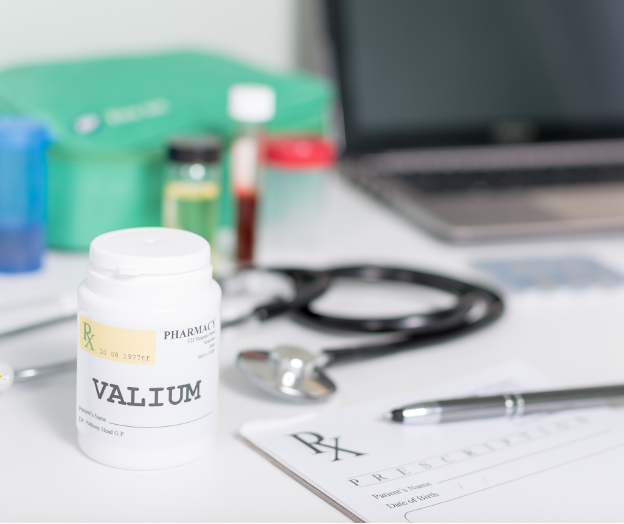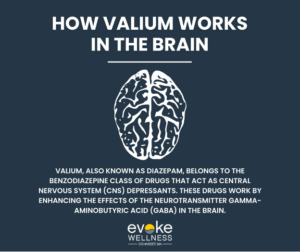The Truth About Valium: Understanding Addiction and Finding Help
You have been relying on Valium for some time now. The numbers show this is more common than you may think. Recent studies indicate:
- Over 92 million Valium prescriptions were filled last year alone.
- 1 in 4 Americans have used Valium recreationally.
- Nearly 10% of Valium users become addicted.
This dependence can negatively impact your health and relationships. Seeking treatment through a drug rehab program can help you regain control of your life. Rehab provides tools like:
- Prescription drug rehab program
- Cognitive-behavioral therapy
- Dialectical behavioral therapy
- Individual therapy and group therapy programs
- PTSD treatment program
With the right help, you can overcome Valium addiction and thrive. The journey starts by taking the first step.
Call us at (617) 917-3485 today or reach out online.
The Dangers of Valium Addiction
Physical Health Risks
Abusing Valium can lead to severe physical dependence. Your body adapts to the drug’s sedative effects, requiring higher doses to feel “normal.” This increases the risk of overdose, coma, and life-threatening respiratory depression.
Mental Health Concerns
Long-term abuse alters brain chemistry, causing anxiety, depression, and cognitive impairment. Withdrawal can trigger seizures, psychosis, and suicidal thoughts. Valium addiction ruins lives.
Social Consequences
Relationships suffer as the drug hijacks your priorities. You may lose your job, home, and self-respect as addiction takes over. The path back to normal life becomes harder each day.
According to the Substance Abuse and Mental Health Services Administration, over 5 million Americans misused sedatives like Valium in 2020. Don’t become a statistic – get help today.
Increasing GABA Activity
GABA is an inhibitory neurotransmitter that slows down nerve signals in the brain. When Valium binds to GABA receptors, it increases the binding of GABA, enhancing its calming effects. This leads to reduced activity in areas of the brain responsible for rational thought, memory, and emotions.
Sedative and Anxiolytic Effects
By amplifying GABA’s inhibitory actions, Valium produces a sedative, hypnotic, and anxiolytic (anti-anxiety) effect. It slows down the firing of neurons, leading to relaxation, reduced anxiety, and sleepiness. The onset of effects is rapid, usually within minutes of oral administration, and can last for several hours.
Tolerance and Dependence Risks
Prolonged use of Valium can lead to the development of tolerance, where higher doses are needed to achieve the same effects. Additionally, physical dependence and addiction are significant risks with long-term benzodiazepine use, as the brain adapts to the drug’s presence. Abrupt discontinuation can trigger severe withdrawal symptoms, including seizures, making medical supervision essential for safe detoxification.
Warning Signs of Valium Addiction
Physical Symptoms
- Drowsiness, fatigue and slurred speech
- Lack of coordination and dizziness
- Nausea, vomiting or constipation
Psychological Changes
- Mood swings and irritability
- Anxiety or depression
- Memory lapses and confusion
Behavioral Signs
- Social withdrawal and isolation
- Lying about or hiding valium use
- Continuing use despite negative impacts
Recognizing these red flags early is crucial for getting help through comprehensive addiction treatment options like inpatient or outpatient rehab programs. Look for reputable facilities offering evidence-based therapies like CBT, DBT, counseling, and holistic care. With the right support, recovery from valium addiction is achievable.
Overcoming Valium Addiction Through Rehab
Valium, a benzodiazepine commonly prescribed for anxiety, can lead to addiction when misused. Fortunately, comprehensive rehab programs offer a path to overcome Valium dependence and achieve lasting recovery.
Detox and Residential Care
The first step is medically supervised detox to safely manage withdrawal symptoms as the body rids itself of Valium. This acute phase transitions into residential treatment addressing underlying causes through:
- Cognitive-behavioral therapy
- Dialectical behavior therapy
- Individual and group counseling
Dual Diagnosis Treatment
Many with Valium addiction also struggle with co-occurring mental health issues like anxiety or depression. Dual diagnosis programs integrate treatment for substance abuse and psychological disorders through specialized therapy and medication management.
Relapse Prevention
To reinforce recovery, outpatient programs provide continued support via:
- Counseling and group sessions
- Relapse prevention education
- Peer support groups like Narcotics Anonymous
By addressing dependence holistically, comprehensive rehab empowers individuals to overcome Valium addiction and reclaim their lives.
Types of Rehab Programs for Valium Addiction
Inpatient Rehab Programs
Inpatient or residential treatment programs provide 24/7 medically supervised care. This allows for a safe, controlled environment to undergo detox and intensive therapy. Key benefits include:
- Around-the-clock support and monitoring
- Separation from drug-using environments
- Structured treatment schedules
Outpatient Programs
Outpatient programs allow more flexibility while still providing comprehensive care. Options range from partial hospitalization to regular counseling sessions. Ideal for those with mild addictions or responsibilities that prevent inpatient stay.
Finding the Right Valium Addiction Treatment Center
Personalized Treatment Plans
When seeking treatment for Valium addiction, it’s crucial to find a program tailored to your unique needs. A reputable rehab center will create an individualized plan addressing your specific challenges, whether it’s managing withdrawal symptoms, treating co-occurring mental health issues, or providing holistic therapies for overall well-being.
Evidence-Based Therapies
Look for a center that offers evidence-based therapies proven effective in treating benzodiazepine addiction, such as:
- Cognitive-behavioral therapy (CBT)
- Dialectical behavior therapy (DBT)
- Individual and group counseling
- Medication-assisted treatment (MAT)
These approaches not only help overcome physical dependence but also address underlying psychological factors contributing to substance abuse.
Comprehensive Care
An ideal treatment facility should provide comprehensive care addressing all aspects of recovery, including:
- Medically supervised detox
- Dual diagnosis treatment for co-occurring disorders
- Trauma-informed therapies (for PTSD)
- Aftercare and relapse prevention planning
A well-rounded program equips you with the skills and support needed for lasting sobriety.
FAQ: How Long Does Valium Stay in Your System?
Factors Affecting Detection Time
- The half-life of Valium (diazepam) ranges from 20-100 hours, meaning it takes this time for half the drug to be eliminated from your body. Its relatively long half-life means Valium stays detectable for longer compared to other benzodiazepines.
- For occasional users taking standard doses, Valium is generally detectable in urine for 2-4 days after the last dose.
- However, for chronic or heavy users, Valium’s metabolites can show up on drug tests for over a month after discontinuing use.
Metabolism and Elimination
Factors like age, weight, metabolism, liver and kidney function all influence how quickly Valium clears your system. The elderly and those with impaired organ function eliminate the drug more slowly.
Higher doses taken over longer periods will also increase the length of time Valium is detectable after last use. Abrupt discontinuation without tapering doses can prolong detection further.
Safe Cessation Is Key
Attempting to stop Valium suddenly after extended use can trigger severe withdrawal symptoms like seizures. Medical detox under supervision is crucial to safely eliminate the drug from your body over time while managing withdrawal effects.
Conclusion
You now understand that valium addiction is a serious issue affecting many people. With proper treatment and support, recovery is possible. Consider an inpatient program offering evidence-based therapies like CBT and DBT. A customized treatment plan addresses underlying issues fueling your addiction. You’ll get 24/7 support from experts guiding your recovery journey. With hard work in rehab and ongoing aftercare, you can reclaim your health and happiness. Start by calling a helpline to discuss programs that fit your needs. Take the first step – you deserve to be free from addiction.
Begin Your Journey with Evoke Wellness at Cohasset
If you or a loved one is considering treatment, Evoke Wellness at Cohasset invites you to contact us. Our compassionate team is ready to answer your questions, discuss your needs, and help you take the first steps toward recovery. In Cohasset, you’ll find more than just a treatment program – you’ll discover a community dedicated to your wellness and success. Together, let’s embrace the journey to recovery and the promise of a new beginning. Call us at (617) 917-3485 today or reach out online.





